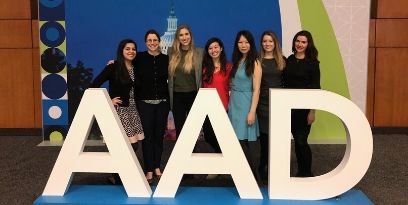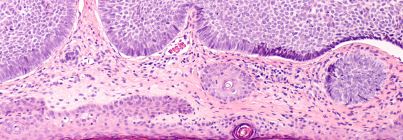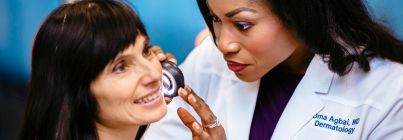Didactics and Conferences
At UC Davis Health, we greatly value our residents’ education and feel it is important to reserve protected time during the week for didactic activities. Every Wednesday morning and every other Thursday morning are reserved for educational content. Highlights of our educational offerings include:
Grand Rounds
Grand Rounds are held on the second and fourth Wednesdays of every month. Interesting or instructive patient cases are presented, followed by a case discussion. Lectures are also offered, often featuring invited national or international experts.
Text Review
Residents are assigned weekly sections of the "Dermatology" textbook by Jean L. Bolognia, M.D. These are reviewed each week as a group along with faculty members. We are currently on an 18-month curriculum schedule, allowing more time to discuss topics in depth. Additional texts reviewed include "Comprehensive Dermatologic Drug Therapy," by Stephen E. Wolverton, M.D., and "Hurwitz Clinical Pediatric Dermatology," by Amy S. Paller, M.D., and Anthony J. Mancini, M.D.
Dermatopathology Curriculum
Our dermatopathology faculty lead a year-round curriculum, featuring bi-monthly lectures and guided reviews of the "Dermatopathology" textbook by Dirk M. Elston, M.D., et al.
Special Lecture Topics
We know that learning extends beyond textbooks! Our comprehensive lecture series covers core dermatology topics as well as essential areas such as billing and coding, ethics, professionalism, wellness and more.
Journal Club
There is a faculty-led journal club every month covering items in the Journal of the American Academy of Dermatology and JAMA Dermatology. There is also a periodic review of other journals.
High-Yield Board Review
We provide targeted lectures from faculty before the CORE board exams to guide studying and highlight key topics. Residents become eligible to take the exam during their second year of residency, after completing at least 1.5 years of dermatology training.
Digital Image Review
Regular sessions featuring clinical images are crucial for developing strong morphology and diagnostic skills. These sessions are led by multiple faculty members and include a variety of formats.
Annual Research Symposium
The Department of Dermatology is deeply committed to research. Each year, the department hosts a morning symposium where clinical and basic science labs showcase their findings, and residents share the results of their own research projects.
Clinical-Pathologic Correlation (CPC) Conference
We hold a monthly Clinical-Pathologic Correlation (CPC) conference, where interesting and challenging cases from our hospital consult service are presented by consult faculty and dermatopathologists. This allows all residents to benefit from our exceptional teaching cases, not just those directly involved in patient care.
Six-Week Introductory Curriculum
For new first-year residents, we offer a six-week introductory curriculum providing a broad overview of dermatologic diseases, morphology, basic surgical techniques, electronic health record (EHR) tips and more. This program significantly eases the transition into residency.
Local Conferences
The Sacramento region has a long-standing, active and collegial community of dermatologists, with UC Davis Health attendings and residents actively engaged. Opportunities to connect include:
- Sacramento Valley Dermatology Society — This group meets every other month to present interesting cases and frequently hosts invited speakers. Residents are encouraged to attend.
- Sacramento Community Journal Club — This group of community dermatologists has been active for about 40 years. They review journals on a monthly basis. Residents are welcome to attend.
National Conferences
We encourage conference attendance. The breadth of dermatology can be surprising, and meeting attendance can open up new opportunities or approaches for residents. Most of our residents attend the annual American Academy of Dermatology meeting, and residents can elect to attend another meeting in an area of their interest, if they wish. Additional meeting time for the presentation of research findings is also available.



